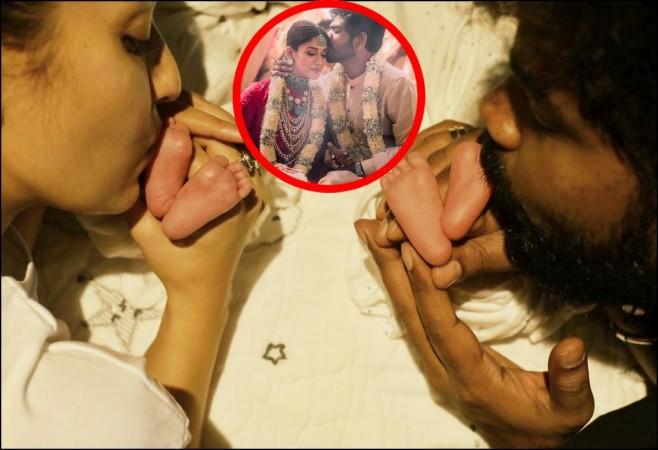On Sunday evening, power couple Nayanthara and Vignesh Shivan welcomed twin boys. The couple took to social media and shared the wonderful news. Fans and friends extended their heartiest wishes to the couple for embracing parenthood. However, these good wishes have now stirred controversy. Although the couple hasn't made an official statement, several reports claim that the boys were conceived through surrogacy as Nayanthara and Vignesh got married in June 2022.

And now questions are being raised about whether the couple followed the procedures required by the Indian surrogacy laws, and whether is there any time restrictions to conceive. During a press conference on Monday, the questions were posed to Tamil Nadu Health Minister Ma Subramanian who has said that an inquiry will be conducted.
Nayan & Me have become Amma & Appa❤️
— Vignesh Shivan (@VigneshShivN) October 9, 2022
We are blessed with
twin baby Boys❤️❤️
All Our prayers,our ancestors’ blessings combined wit all the good manifestations made, have come 2gethr in the form Of 2 blessed babies for us❤️?
Need all ur blessings for our
Uyir?❤️& Ulagam?❤️ pic.twitter.com/G3NWvVTwo9
Explained: The new laws relating to surrogacy in India
What is surrogacy?
The Act defines surrogacy as a practice where a woman gives birth to a child for an intending couple with the intention to hand it over to them after the birth. It is permitted only for altruistic purposes or for couples who suffer from proven infertility or disease.
What is commercial surrogacy?
Surrogacy is prohibited for commercial purposes including for sale, prostitution or any other forms of exploitation. Moreover, once the child is born, it will be deemed to be the biological child of the couple for all intents and purposes.
Is commercial surrogacy allowed in India?
In India, commercial surrogacy was allowed until a new law – The Surrogacy (Regulation) Act, 2021– came was passed in December 2021 and came into effect on January 25, 2022.
What is the meaning of altruistic surrogacy?
However, since December 2021, only 'altruistic surrogacy' is allowed, meaning no remuneration or monetary incentive is provided to the surrogate mother, except the medical expenses. As per the new rules, a surrogate mother has to be genetically related to the couple.
Who can be a surrogate?
The new rules also state, other than a couple, who have a 'medical indication necessitating gestational surrogacy', only an Indian woman who is a widow or divorcee between the age of 35 to 45 years can opt for surrogacy.
Who regulates surrogacy?
The Centre and State governments constituted a National Surrogacy Board (NSB) and State Surrogacy Boards (SSB) respectively, tasked with enforcing standards for surrogacy clinics, investigating breaches and recommending modifications. Further, surrogacy clinics need to apply for registration within 60 days of the appointment of the appropriate authority.
What are the offences?
According to the surrogacy (Regulation) Act 2021, any couple who takes a baby through commercial surrogacy will be punished with a fine of up to Rs 50,000 rupees as well as imprisonment of 5 years. If the couple commits the same offence multiple times, the fine may be extended up to Rs 1 lakh along with imprisonment of 10 years. Any individual, organization, or clinic that gets involved in the exploitation of surrogate mothers or children born via surrogacy will face imprisonment of up to ten years, along with a Rs 10 lakhs fine.
Nayanthara and Vignesh's love story
Beyond the flashlights and fame, there lives a dream named Nayanthara ?#Tudum presents the story of her rise to superstardom - Nayanthara : Beyond the Fairy Tale, coming soon! pic.twitter.com/FMMAh8AQcc
— Netflix India (@NetflixIndia) September 24, 2022
Meanwhile, after over seven years of courtship, Nayanthara and Vignesh got married in June this year. The wedding took place at a luxury resort Mahabalipuram with the presence of the who's who of the Indian film industry. The couple's wedding was a star-studded bash. Bollywood superstar Shah Rukh Khan had flown down to Chennai to attend the ceremony, apart from that the wedding was attended by Rajinikanth, Karthi, Atlee, Vijay Sethupathi, and Mani Ratnam and many more.









![Budget 2026-27 aimed at empowering poor and increasing farmers' income: PM Modi [Watch]](https://data1.ibtimes.co.in/en/full/827940/budget-2026-27-aimed-empowering-poor-increasing-farmers-income-pm-modi-watch.jpg?w=220&h=138)






